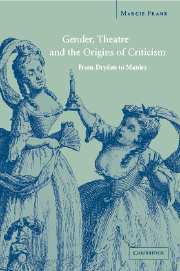Book contents
- Frontmatter
- Contents
- Acknowledgments
- Introduction. The critical stage
- 1 “Equal to ourselves”: John Dryden's national literary history
- 2 Staging criticism, staging Milton: John Dryden's The State of Innocence
- 3 Imitating Shakespeare: gender and criticism
- 4 The female playwright and the city lady
- 5 Scandals of a female nature
- Notes
- Bibliography
- Index
1 - “Equal to ourselves”: John Dryden's national literary history
Published online by Cambridge University Press: 22 September 2009
- Frontmatter
- Contents
- Acknowledgments
- Introduction. The critical stage
- 1 “Equal to ourselves”: John Dryden's national literary history
- 2 Staging criticism, staging Milton: John Dryden's The State of Innocence
- 3 Imitating Shakespeare: gender and criticism
- 4 The female playwright and the city lady
- 5 Scandals of a female nature
- Notes
- Bibliography
- Index
Summary
At the end of the seventeenth century, towards the end of his life, John Dryden wrote “The Secular Masque.” Janus, the mythological figure who faces in two directions, presides over a procession of Diana, Mars and Venus, who come on stage one at a time to describe the hunts, the battles and the loves that dominate the age each has ushered in. In certain respects, this is familiar territory, at least in terms of the critical reception of Dryden – he treats the “age,” the seculum, as mediated through classical tropes and figures in a form associated with outmoded absolutist court entertainment that nevertheless promises amelioration of both the immediate and the ancient past. Chronos complains of being “Weary, weary” (line 7) of the weight of the globe on his back, and laughing Momus, a figure for ridicule, finally announces: “’Tis well an Old Age is out, / And time to begin a New” (lines 90–91). It would be easy to see “The Secular Masque” as representing a characteristic problem in Dryden's work – an inability to relinquish neo-classicism and an equal inability to endorse fully the “New.”
Dryden's critical career has traditionally been viewed as the site of struggle between his adherence to a neo-classicism, which offers unhampered access to the achievements of the literary past, and a modernism, which insists on the ability of present writers to “improve” that past. Accounts of this struggle could thus be said to take the two-faced Janus as an emblem for Dryden's criticism.
- Type
- Chapter
- Information
- Gender, Theatre, and the Origins of CriticismFrom Dryden to Manley, pp. 15 - 41Publisher: Cambridge University PressPrint publication year: 2002



